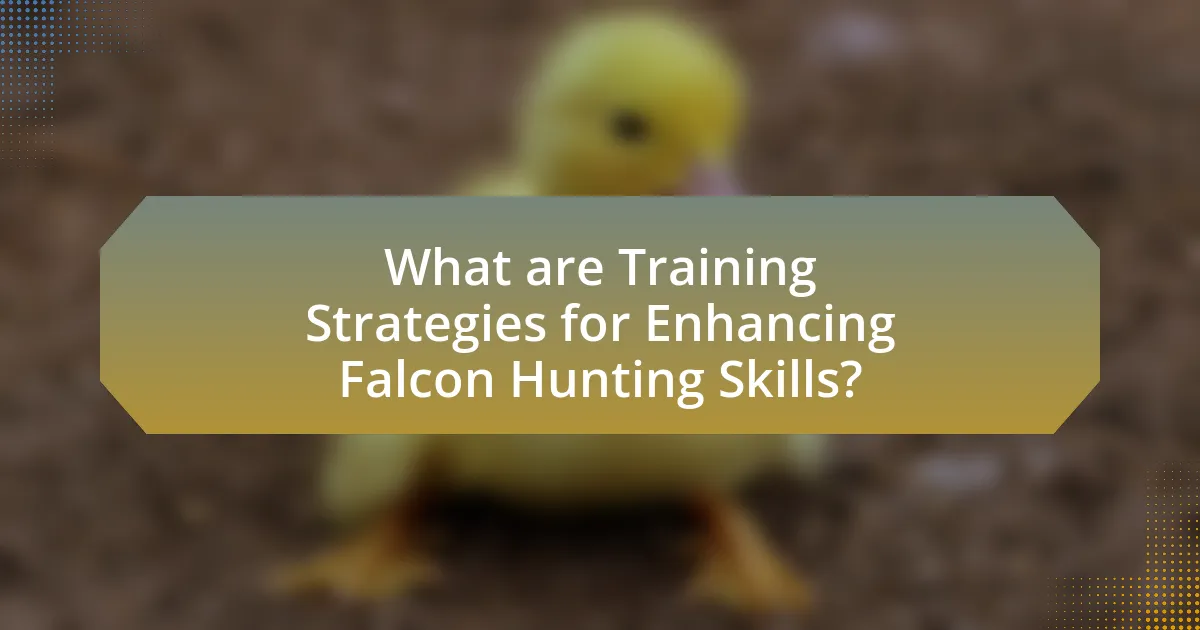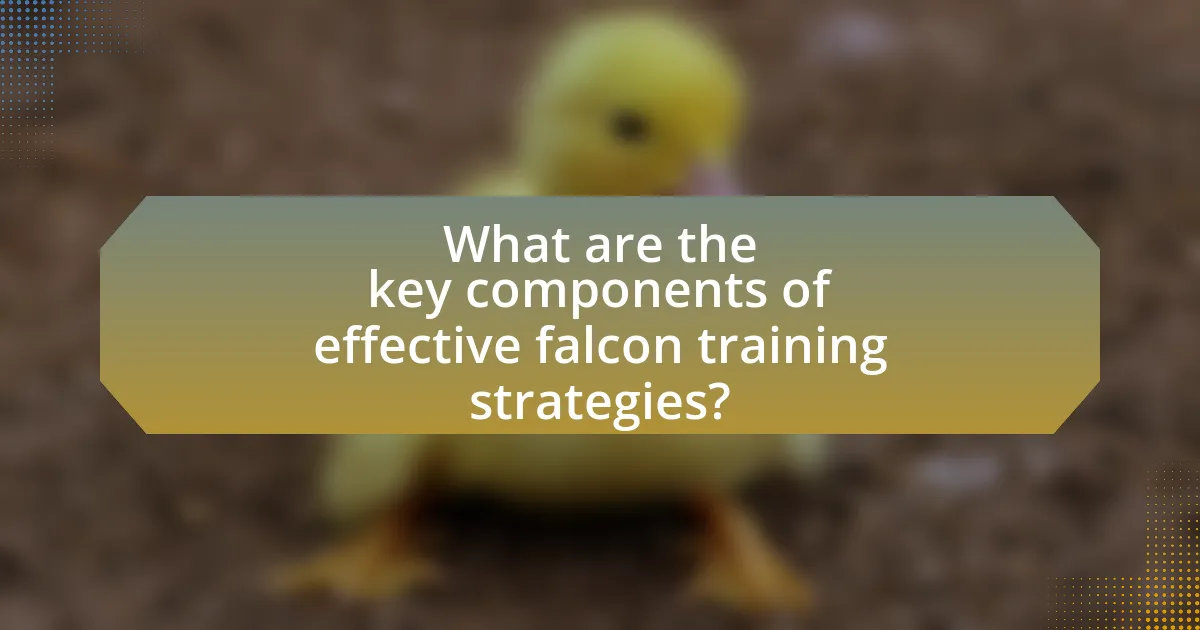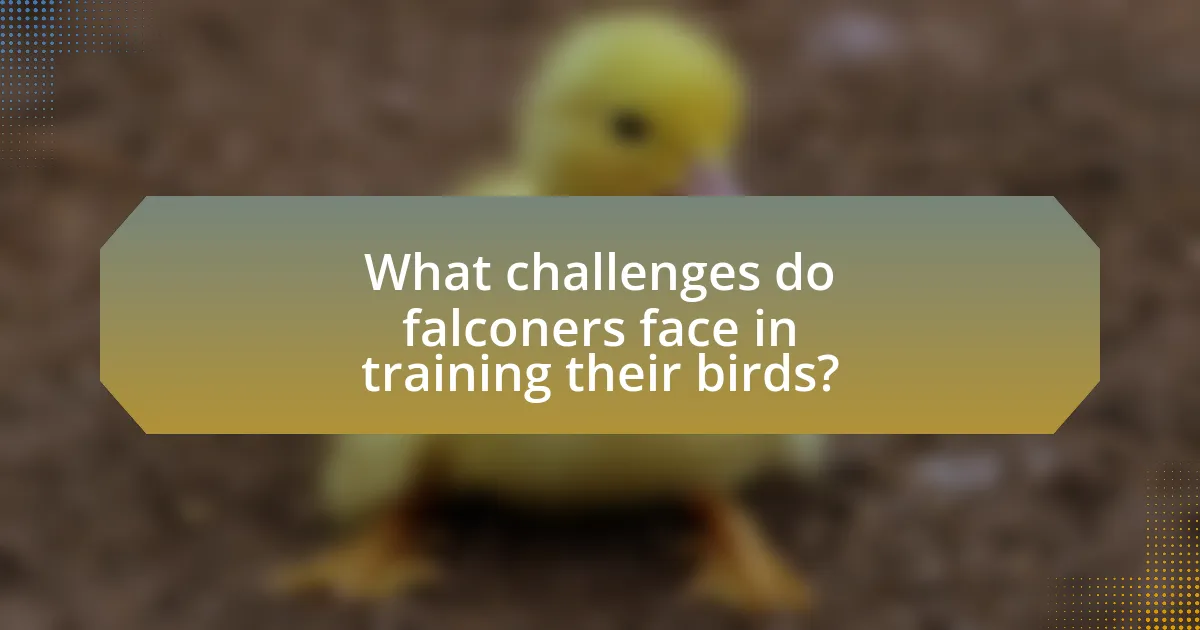The article focuses on training strategies for enhancing falcon hunting skills, emphasizing the importance of consistent exposure to live prey, positive reinforcement, and gradual skill progression. It outlines how these strategies improve hunting performance by enhancing physical conditioning, honing instinctual behaviors, and increasing responsiveness to commands. Specific skills targeted in training include falconry handling, flight control, prey recognition, and hunting techniques, with variations based on falcon species. The article also discusses the essential role of training in fostering the relationship between falconers and their birds, the risks of inadequate training, and best practices for effective training regimens. Additionally, it highlights common challenges faced by falconers and practical tips for tracking progress and improving training outcomes.
What are Training Strategies for Enhancing Falcon Hunting Skills?

Training strategies for enhancing falcon hunting skills include consistent exposure to live prey, positive reinforcement techniques, and gradual skill progression. Consistent exposure to live prey allows falcons to develop their hunting instincts and improve their accuracy. Positive reinforcement, such as rewarding successful hunts with food, encourages desired behaviors and strengthens the bond between the falcon and the handler. Gradual skill progression involves starting with simpler tasks and gradually increasing difficulty, which helps the falcon build confidence and competence in hunting. These strategies are supported by studies in falconry that emphasize the importance of behavioral conditioning and the natural instincts of raptors in training.
How do these training strategies improve falcon hunting performance?
Training strategies improve falcon hunting performance by enhancing the bird’s physical conditioning, honing its instinctual behaviors, and increasing its responsiveness to commands. These strategies often include targeted exercises that build strength and endurance, which are crucial for sustained flight and effective hunting. Additionally, training techniques such as lure training and positive reinforcement help to refine the falcon’s hunting skills, making it more adept at tracking and capturing prey. Research indicates that consistent training leads to improved success rates in hunting, as trained falcons demonstrate better focus and agility compared to untrained counterparts.
What specific skills are targeted in falcon hunting training?
Falcon hunting training specifically targets skills such as falconry handling, flight control, prey recognition, and hunting techniques. Falconry handling involves developing a bond with the bird, ensuring it responds to commands and remains calm. Flight control focuses on training the falcon to fly accurately and return on cue, which is essential for successful hunting. Prey recognition is crucial, as the falcon must identify and pursue appropriate targets in the wild. Lastly, hunting techniques encompass strategies for effectively capturing prey, including understanding the bird’s natural instincts and behaviors. These skills are essential for both the safety of the falcon and the success of the hunt.
How do training strategies vary based on falcon species?
Training strategies vary significantly based on falcon species due to differences in behavior, hunting techniques, and physical attributes. For instance, larger species like the Peregrine Falcon require more extensive flight training to accommodate their high-speed hunting style, while smaller species such as the American Kestrel may focus more on agility and precision in short bursts. Additionally, species that hunt in open areas, like the Gyrfalcon, benefit from long-distance training sessions to enhance their endurance, whereas woodland species, such as the Merlin, may require training that emphasizes maneuverability in confined spaces. These tailored approaches ensure that each species develops the specific skills necessary for their unique hunting environments and prey.
Why is training essential for falcon hunting?
Training is essential for falcon hunting because it ensures that the falcon develops the necessary skills to hunt effectively and respond to commands. Proper training enhances the bird’s ability to locate, chase, and capture prey, which is critical for successful hunting. Additionally, trained falcons exhibit improved focus and discipline, allowing them to work in harmony with their handlers. Historical practices in falconry demonstrate that structured training methods, such as the use of lure and reward systems, have been employed for centuries to optimize hunting performance, confirming the importance of training in this traditional practice.
What are the risks of inadequate training for falcons?
Inadequate training for falcons can lead to several significant risks, including behavioral issues, reduced hunting efficiency, and potential harm to both the falcon and its handler. Behavioral issues may manifest as aggression or fear, making the falcon difficult to manage and increasing the likelihood of accidents. Reduced hunting efficiency occurs when a falcon lacks the necessary skills to hunt effectively, which can lead to starvation or failure to thrive in the wild. Additionally, poorly trained falcons may pose a danger to their handlers, as unpredictable behavior can result in injuries. These risks highlight the importance of comprehensive training programs that address the specific needs of falcons to ensure their well-being and effectiveness in hunting.
How does training impact the relationship between falconers and their birds?
Training significantly enhances the relationship between falconers and their birds by fostering trust and communication. Through consistent training, falconers establish a bond with their birds, which is crucial for effective hunting. This bond is built on mutual understanding, where the bird learns to respond to commands and cues from the falconer, leading to improved performance during hunts. Research indicates that positive reinforcement techniques, such as rewards for successful flights, strengthen this relationship, making the birds more willing to cooperate and engage in hunting activities. Consequently, the training process not only improves hunting skills but also deepens the emotional connection between falconers and their birds, resulting in a more harmonious partnership.
What are the key components of effective falcon training strategies?

The key components of effective falcon training strategies include consistent conditioning, positive reinforcement, and gradual exposure to hunting scenarios. Consistent conditioning establishes a routine that helps the falcon adapt to training sessions, while positive reinforcement encourages desired behaviors through rewards, enhancing the falcon’s motivation. Gradual exposure to hunting scenarios allows the falcon to develop skills in a controlled environment, ensuring it can handle real hunting situations effectively. These components are supported by studies showing that structured training methods lead to improved hunting success rates in falcons.
How does conditioning play a role in falcon training?
Conditioning is essential in falcon training as it establishes a predictable response to stimuli, enhancing the bird’s performance and reliability during hunts. Through techniques such as positive reinforcement, trainers condition falcons to associate specific cues, like a whistle or a visual signal, with rewards such as food or praise. This method not only improves the falcon’s ability to follow commands but also increases its motivation to engage in hunting activities. Studies have shown that conditioned responses lead to improved hunting success rates, as the falcon learns to anticipate and react appropriately to various hunting scenarios.
What methods are used for conditioning falcons?
The primary methods used for conditioning falcons include positive reinforcement, flight training, and exposure to hunting scenarios. Positive reinforcement involves rewarding the falcon with food or praise for desired behaviors, which encourages them to repeat those actions. Flight training focuses on developing the bird’s flying skills through controlled exercises, gradually increasing distance and complexity to enhance their endurance and agility. Exposure to hunting scenarios simulates real hunting conditions, allowing falcons to practice their skills in a controlled environment, which is essential for their development as effective hunters. These methods are widely recognized in falconry and have been proven effective in enhancing the hunting abilities of trained falcons.
How does conditioning affect a falcon’s hunting instincts?
Conditioning significantly enhances a falcon’s hunting instincts by reinforcing desired behaviors through repeated exposure to specific stimuli. This process allows falcons to associate certain cues, such as the sight of prey or the sound of a whistle, with successful hunting outcomes, thereby increasing their responsiveness and efficiency during hunts. Research indicates that conditioned falcons demonstrate improved targeting accuracy and quicker reaction times, which are critical for successful predation. For instance, studies have shown that falcons trained with positive reinforcement techniques exhibit heightened focus and agility, leading to a more effective hunting strategy.
What types of training techniques are commonly used?
Commonly used training techniques for enhancing falcon hunting skills include positive reinforcement, free flight training, and lure training. Positive reinforcement involves rewarding the falcon for desired behaviors, which encourages learning and strengthens the bond between the falconer and the bird. Free flight training allows the falcon to fly freely while being called back, promoting natural hunting instincts and improving the bird’s ability to hunt effectively. Lure training utilizes a baited lure to simulate prey, helping the falcon develop its chasing and catching skills. These techniques are widely recognized in falconry practices and are essential for developing a falcon’s hunting proficiency.
What is the role of lure training in falcon hunting?
Lure training plays a crucial role in falcon hunting by teaching the bird to associate the lure with food rewards, enhancing its responsiveness and hunting efficiency. This training method involves using a lure, often resembling prey, to attract the falcon and reinforce its hunting instincts. By consistently rewarding the falcon with food when it returns to the lure, trainers can improve the bird’s recall and focus during hunts, leading to more successful captures. Studies have shown that effective lure training can significantly increase a falcon’s hunting success rate, as it fosters a strong bond between the falcon and the trainer while honing the bird’s natural predatory skills.
How does free flying contribute to a falcon’s hunting skills?
Free flying enhances a falcon’s hunting skills by allowing the bird to practice its natural instincts in an unrestricted environment. This practice helps improve its agility, speed, and ability to judge distances accurately, which are crucial for successful hunting. Research indicates that falcons that engage in free flying develop better spatial awareness and hunting strategies, as they learn to navigate and respond to real-time stimuli, such as the movement of prey. This experiential learning is vital for honing their predatory skills, making them more effective hunters in the wild.
What challenges do falconers face in training their birds?

Falconers face several challenges in training their birds, primarily related to the birds’ natural instincts and behaviors. These challenges include the difficulty in establishing trust and a strong bond between the falconer and the bird, as well as managing the bird’s instinct to hunt independently, which can interfere with training sessions. Additionally, falconers must contend with environmental factors such as weather conditions that can affect training schedules and the availability of suitable training locations. The need for consistent and patient reinforcement of commands is crucial, as falcons can be sensitive to changes in their environment or the falconer’s behavior, which may hinder progress.
How can environmental factors impact falcon training?
Environmental factors significantly impact falcon training by influencing the bird’s behavior, health, and performance. For instance, temperature extremes can affect a falcon’s energy levels and willingness to train, as high heat can lead to dehydration and fatigue, while cold conditions may hinder mobility and responsiveness. Additionally, the presence of natural elements such as wind and terrain can alter a falcon’s hunting techniques and adaptability during training sessions. Studies have shown that falcons trained in varied environmental conditions develop better skills in navigating different hunting scenarios, enhancing their overall effectiveness.
What are the best practices for training in different weather conditions?
The best practices for training in different weather conditions include adjusting training schedules, using appropriate gear, and monitoring the health of the falcon. Training should be scheduled during cooler parts of the day in hot weather to prevent overheating, while in cold weather, sessions should be shorter to avoid exposure to extreme temperatures. Appropriate gear, such as insulated gloves and protective clothing, is essential for trainers in cold conditions, while lightweight, breathable fabrics are recommended for hot weather. Additionally, monitoring the falcon’s hydration and energy levels is crucial, as dehydration can occur quickly in high temperatures, and hypothermia can be a risk in cold conditions. These practices ensure the safety and effectiveness of training sessions, ultimately enhancing the falcon’s hunting skills.
How do distractions affect a falcon’s training progress?
Distractions significantly hinder a falcon’s training progress by interrupting focus and reducing the effectiveness of learning. When a falcon is exposed to distractions, such as loud noises or the presence of other animals, its ability to concentrate on training tasks diminishes, leading to slower skill acquisition. Research indicates that consistent exposure to distractions can result in increased stress levels in birds, which further impairs their performance and responsiveness during training sessions. Therefore, minimizing distractions is crucial for optimizing a falcon’s training outcomes and enhancing its hunting skills.
What are common mistakes in falcon training and how can they be avoided?
Common mistakes in falcon training include inconsistent feeding schedules, lack of proper socialization, and inadequate conditioning. To avoid these mistakes, trainers should establish a regular feeding routine to build trust and ensure the falcon associates training with positive experiences. Socialization with other birds and humans is crucial for developing a well-adjusted falcon, so trainers should gradually introduce the bird to various environments and stimuli. Additionally, conditioning should be tailored to the individual bird’s needs, incorporating varied exercises to enhance physical fitness and hunting skills. These strategies are supported by falconry best practices, which emphasize the importance of consistency, socialization, and tailored training regimens for successful falcon training.
What are the signs of overtraining in falcons?
The signs of overtraining in falcons include decreased performance, lethargy, increased aggression, and changes in appetite. When falcons are overtrained, they may exhibit a decline in their hunting efficiency, showing less interest in training sessions or prey. Lethargy manifests as reduced energy levels, making the falcon less active and responsive. Increased aggression can be observed as irritability or hostility towards handlers or other birds. Additionally, changes in appetite, such as reduced food intake or unusual eating patterns, can indicate stress from overtraining. These signs are critical for falconers to monitor to ensure the well-being and optimal performance of their birds.
How can falconers ensure a balanced training regimen?
Falconers can ensure a balanced training regimen by incorporating a variety of training techniques that address physical conditioning, mental stimulation, and hunting skills. This approach includes regular exercise sessions to maintain the bird’s physical health, varied training environments to enhance adaptability, and consistent practice of hunting techniques to refine skills. Research indicates that a well-rounded training program not only improves the falcon’s performance but also strengthens the bond between the falconer and the bird, leading to more effective hunting outcomes.
What practical tips can enhance falcon hunting training?
To enhance falcon hunting training, consistent practice and positive reinforcement are essential. Regularly exposing the falcon to various hunting scenarios helps develop its skills and adaptability. Incorporating varied prey types during training sessions allows the falcon to refine its hunting techniques and improve its response to different situations. Additionally, utilizing a lure system can effectively simulate hunting conditions, encouraging the falcon to engage and pursue. Research indicates that structured training sessions, combined with gradual increases in difficulty, lead to better performance outcomes in hunting scenarios.
How can falconers effectively track their bird’s progress?
Falconers can effectively track their bird’s progress by utilizing telemetry systems that provide real-time data on the bird’s location and behavior. These systems often include GPS transmitters that are attached to the bird, allowing falconers to monitor flight patterns, hunting success, and overall health. Studies have shown that telemetry can significantly enhance the understanding of a bird’s performance in the field, as it provides quantifiable data on distances flown and time spent hunting, which are critical for assessing training effectiveness.
What resources are available for falcon training improvement?
Resources available for falcon training improvement include specialized training programs, instructional books, online courses, and experienced falconers as mentors. These resources provide structured guidance and practical techniques to enhance the skills of both the falcon and the handler. For instance, books such as “The Art of Falconry” by Frederick II offer historical insights and methods that have been proven effective over centuries. Additionally, organizations like the North American Falconers Association provide workshops and seminars that focus on modern training techniques and best practices. Online platforms also offer video tutorials and forums where falconers can share experiences and advice, further enriching the training process.


